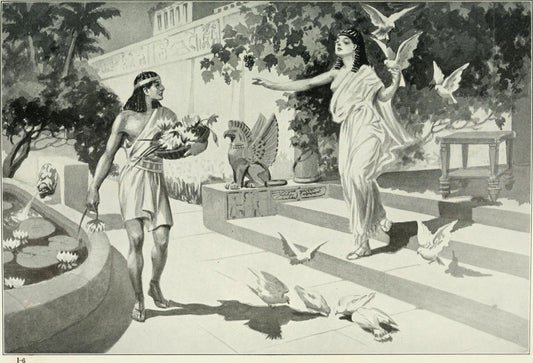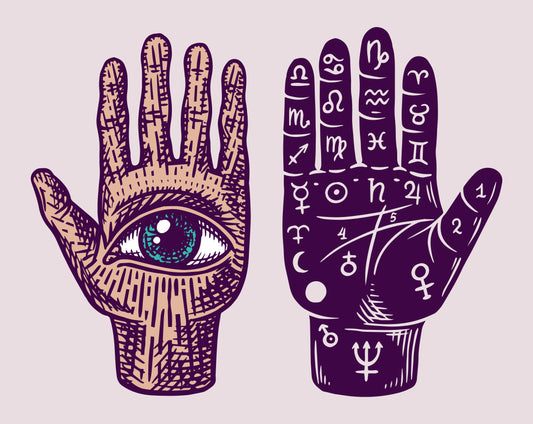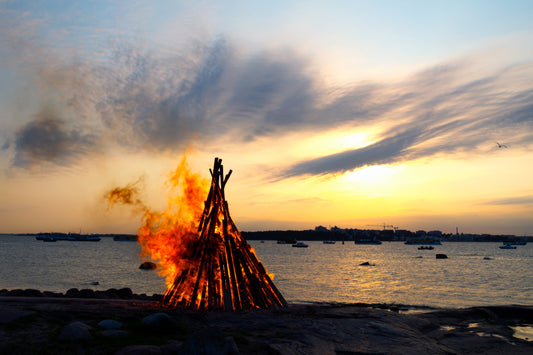Litha
If you are anywhere in the Northern Hemisphere, you are likely in the thick of summer now as the sun swings high in the sky and sticks around until late hours. The bugs are breeding and they hum around us, and now is a time of lounging in bodies of water, of sweet sticky ice cream, and of heat.
The Pagans celebrate Litha during this time, one of the eight sabbats. This holiday is also known as Midsummer and takes place on the longest day of the year or anywhere from June 19th-24th.
The longest day also brings the shortest night, and on this day the Pagans would celebrate abundance and fertility before the days began to shorten once again and the nights start to stretch.
It was said that on this day, the Oak King and Holly King battle, and once the Holly King wins, the days get shorter as he oversees the descent into winter cold.

Where did Litha originate?
Most ancient cultures have some celebration for the summer solstice, and Litha traditions borrow from many of these. Solstice has been celebrated for many, many years, even Stonehenge records the point of the sun during the summer solstice. Stonehenge was build around 2500 BCE, meaning solstice has been recognized since then and likely celebrated for around as long.
We know the Celts, Ancient Romans, and early Christians all celebrated this event with some shared traditions, and some unique to their specific culture.

How was Litha celebrated?
Fire is an element of Litha, so many cultures used bonfires to celebrate this event. The Celts and Pagans lit bonfires to assist the sun's journey across the sky as it shortened. They believed on this day and night, the faerie realm was accessible, especially at twilight and would offer blessings.
The Celts celebrated Celtic goddess Danu (the goddess of earth and fruitfulness) on Litha. Ancient Irish mythology believed Danu to be the Mother of Tuatha De Danaan, a tribe of ancient Irish people who were said to have invaded Ireland until their defeat on midsummer's day. After defeat, the myth says they retreated into the hills and mountains and eventually turned into the Faerie folk of today.
Eventually, Christianity adopted the Midsummer Night holiday as well, a time during which John the Baptist is celebrated.
To celebrate, the Pagans stayed up to watch the sunrise and they sat around a bonfire lit on top of hills or near holy wells or other sacred places. The bonfire was supposed to represent the power of the sun at its strongest time, and they often used oak for the wood and scattered aromatic herbs in the fire. Oak is an important symbol in Midsummer because of the myth of the Oak King. The Celtic name for Oak "duir" also means doorway, and this signifies traveling through the doorway to the second part of the year where the days shorten and grow colder.
How can we celebrate today?
We can adopt some of the tradition of Litha and combine it with modernized ways of celebrating these Pagan holidays for a fulfilling and positive experience on the longest days of the year.
Modern day Pagans use this day to reflect on their success from the first half of the year and set intentions for the second half. By aligning yourself with the powerful sun and summer energies, you may expand your goals and desires. Don't forget to thank Mother Earth for all the bounty and abundance!
Here are some ways to celebrate Litha:
- make floral wreaths with summer flowers and herbs and hand them around your house and on the front door
- gather herbs during this time of abundance and dry them to use during the rest of the year
- host a bonfire! invite friends and discuss your blessings and goals
- meditate on the light and dark balance in your life and mind
- build sundials and meditate on the sun
There are many ways to celebrate, so make it your own! They say during Midsummer the veil between the Faeries and us is extra thin and our magical capabilities are stronger than usual, so set some goals and make things happen in your life. Most importantly, be aware of the summer and appreciate it while you can.





